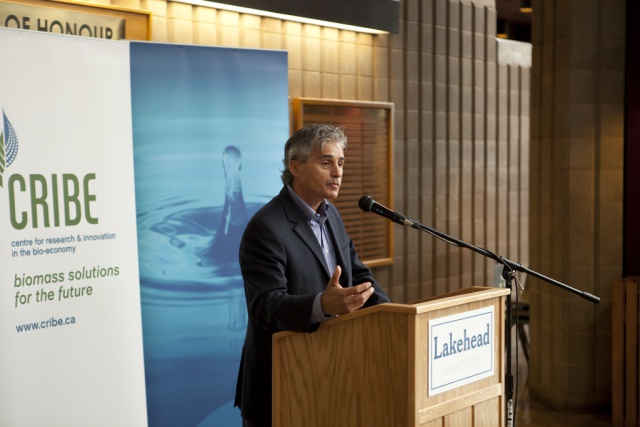
Features
Research & Innovation
Ontario research partners focus on chemicals from poplar
CRIBE is providing $3 million for an innovative partnership between Lakehead University's Biorefining Research Initiative (LU) and G2 BioChem in Chatham, Ont.
June 10, 2011 By Pulp & Paper Canada
 Thunder Bay-Atikokan MPP Bill Mauro at the announcement of CRIBE's funding for research into biochemicals from poplar.
Thunder Bay-Atikokan MPP Bill Mauro at the announcement of CRIBE's funding for research into biochemicals from poplar. CRIBE is providing $3 million for an innovative partnership between Lakehead University’s Biorefining Research Initiative (LU) and G2 BioChem in Chatham, Ont.
G2 BioChem’s facility is the only one in the province that will allow the complete breakdown of wood fibre outside of a laboratory environment. This unique opportunity will allow the Thunder Bay university to be at the forefront of new uses for forest biomass.
G2 BioChem’s main focus will be on design and development of biorefinery processes, using its new $42M demonstration plant at its Center of Excellence in Chatham. Meanwhile, LU will focus on the development of value-added chemicals from the process. Using poplar, an underutilized species, G2 BioChem will develop ways to recover hemicellulose, lignin, and bark extracts. Lakehead will in turn look to developing new value-added uses from these products, such as adhesives, biochemicals, and biopharmaceuticals.
CRIBE, the Centre for Research and Innovation in the Bio-Economy, is an independent, not-for-profit research corporation with a mandate to transform the forest products industry in Northern Ontario, and $25 million from the provincial government to invest.
Of the total $3 million in funding for this project, CRIBE is providing $2 million to G2 BioChem in Chatham and $894,500 to Lakehead University. CRIBE’s participation in this project will give access to the full research facility and industrial expertise at Chatham to LU researchers, students and CRIBE members. Results from work at the demonstration plant will be used by CRIBE, its clients in Northern Ontario, and LU researchers to develop local projects that will generate revenue and bring new jobs to northern communities.
In addition, CRIBE is also providing $150,000 to the biochar/biomass recovery project at Lakehead University. LU is partnering with Ontario Power Generation and AbitibiBowater to study possible applications for the waste “wood ash” or biochar products left over after using forest biomass to create energy, specifically as an additive to agricultural soil. This will generate cost-savings for the producers by diverting waste from landfill as well as providing a safe, low cost soil amendment for local farmers.
“I am happy to see the work of CRIBE moving forward to find ways to build new economic activity from our sustainable wood fibre,” said Bill Mauro, MPP Thunder Bay-Atitkokan. “This innovative approach taken by our government will most certainly lead to new jobs and investment in Northwestern Ontario to the benefit of us all.”
“We are most grateful to CRIBE for their generous contribution to G2 BioChem’s demonstration plant. This contribution will go a long way to unlocking the future of next generation ethanol,” said Barry Wortzman, president of G2BioChem and vice-president, business development, GreenField Ethanol. “G2 BioChem’s technology optimizes next-generation ethanol yields using all available sugars.”
G2 BioChem will commence construction of its cellulose demonstration plant in 2011.
Print this page